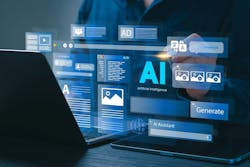GenAI’s role in successful production
Artificial intelligence (AI), particularly generative AI (genAI), is poised to revolutionize process automation by enhancing efficiency, reducing costs and improving product quality, Seeq’s Dustin Johnson wrote in an article for Automation World.
GenAI enables operational machine learning to evolve by providing actionable insights through self-learning based on existing data patterns. This fosters the emergence of the “augmented engineer,” where AI complements human expertise by offering tailored solutions, answering complex queries, and integrating advanced analytics into everyday decision-making.
Get your subscription to Control's tri-weekly newsletter.
With a projected 2.1 million manufacturing jobs in the U.S. potentially going unfilled by 2030, leveraging AI can help bridge workforce gaps by augmenting human capacity and addressing operational challenges more effectively.
To harness genAI’s potential, organizations must first prioritize data quality and ensure their teams are data-literate. High-quality, relevant data serves as the backbone for accurate and actionable AI insights, emphasizing the adage, "garbage in, garbage out."
Furthermore, industrial teams must adapt to evolving AI technologies by fostering continuous learning and addressing common barriers like time constraints and mistrust of AI outputs. Leading-edge manufacturers use AI to facilitate on-demand training and contextualized guidance, streamlining complex processes and improving team efficiency. Read more in the Automation World article.

